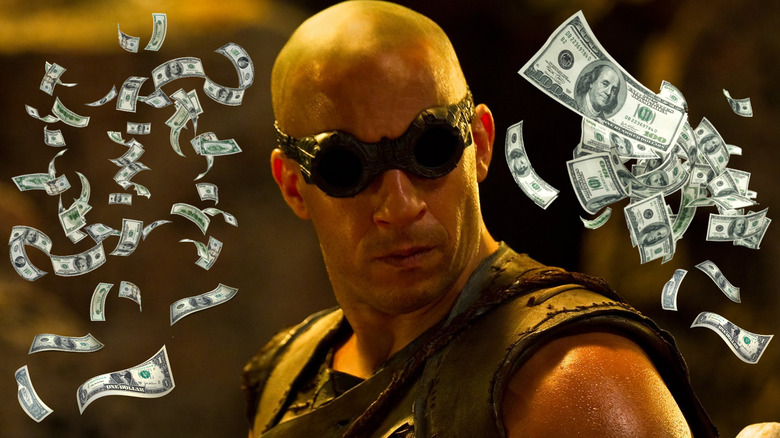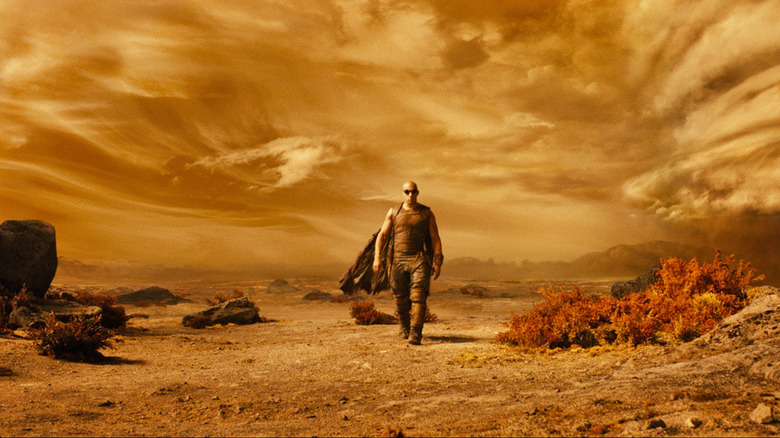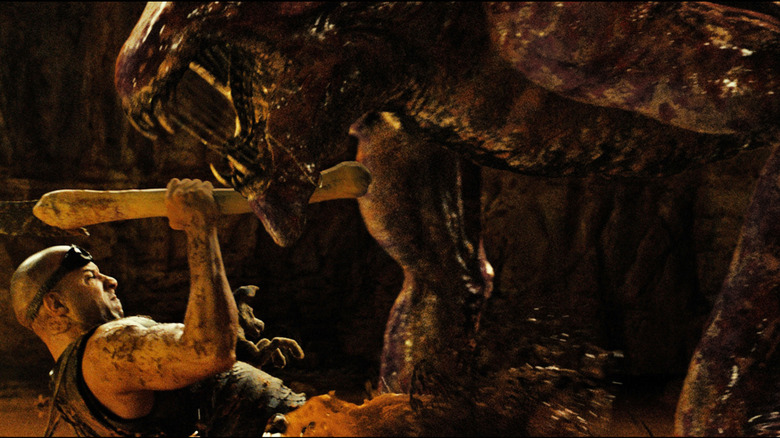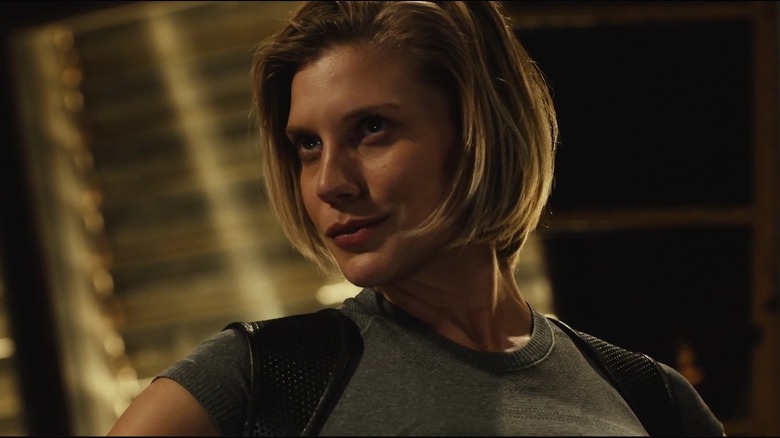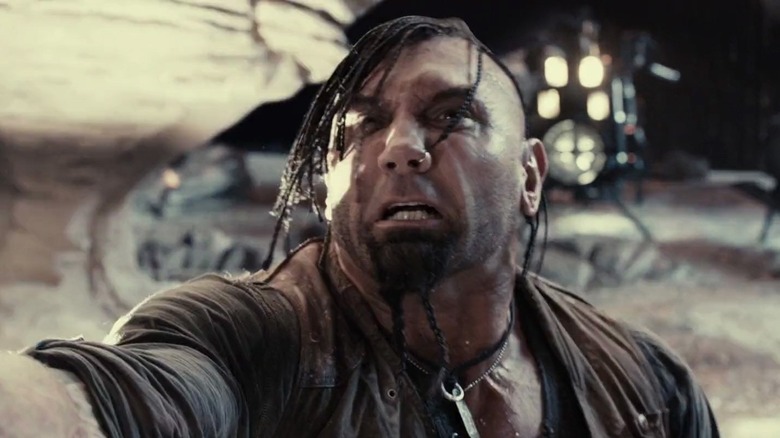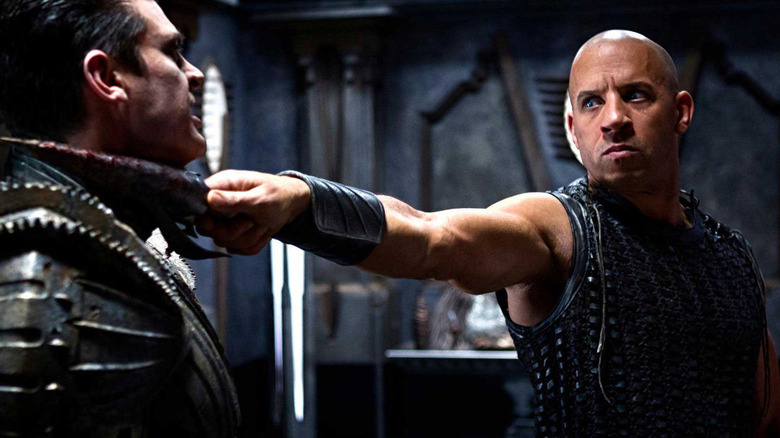Riddick Became A Box Office Success Because Vin Diesel Refused To Let His Passion Project Die
(Welcome to Tales from the Box Office, our column that examines box office miracles, disasters, and everything in between, as well as what we can learn from them.)
It's safe to say that Vin Diesel is an actor who has made the most out of every single opportunity given to him. From voicing Groot in Marvel's "Guardians of the Galaxy" franchise — a role that requires him to say just three words over and over again most of the time (and in multiple languages) — to leading the "Fast & Furious" series as Dom Toretto, Diesel has generated more than $14 billion at the box office through the movies he's starred in. Yet, it is a modest, mid-budget hit from a decade ago that remains arguably the most fascinating thing he's ever done. With 2013's "Riddick," Diesel used every tool at his disposal to bring a passion project to fruition.
In the time between the release of the "Pitch Black" sequel "The Chronicles of Riddick" in 2004 and "Riddick" in 2013, Diesel became one of the biggest stars in Hollywood, in no small part thanks to "Fast & Furious" becoming a multi-billion-dollar juggernaut, following the aftermath of the wildly successful "Fast Five." With that power, rather than chase another big, shiny new franchise, he chose to use all of his cache and might to revisit the character of Riddick and do it in the way he wanted to do it, with no major studio there to tell him no. Even though seemingly everything was working against him and the movie, it actually ended up panning out surprisingly well. Even for those uninterested in the franchise at hand, the story behind it is undeniably fascinating.
In this week's Tales From the Box Office, in honor of the 10th anniversary of "Riddick," we're looking back at the film, the unique way Diesel essentially willed it into existence, how Universal wound up involved in a project they wanted no part of, what happened when the movie finally hit theaters, and what lessons we can learn from it a decade later.
The movie: Riddick
"Pitch Black" kicked this franchise off in 2000 and it's worth remembering that, at that time, Diesel hadn't really had the opportunity to headline a big movie on his own. He was the voice of the title character in "The Iron Giant" and had a small role in "Saving Private Ryan," but outside of "Boiler Room," that was about it. So the fact that he got to lead a studio-released sci-fi film was a big deal. It was a modest hit too, taking in $53 million against a $23 million budget in an era when home video was a much, much bigger deal. Unfortunately, Diesel and director David Twohy, not to mention Universal Pictures, got a little too ambitious with the sequel, 2004's "The Chronicles of Riddick."
Much larger in scope, "The Chronicles of Riddick" cost the studio a whopping $105 million to produce and only pulled in $116 million worldwide. Therefore, Universal wasn't exactly hot on the idea of finishing out what Diesel hoped would be a trilogy. Even so, Diesel kept the dream alive in the years that followed. Speaking with ComingSoon.net in 2006, the actor explained his ambitious plans for the series.
"When I was in the process of creating this mythology for 'Chronicles of Riddick,' the idea was to create a story, a trilogy, that would start at the end of 'Pitch Black' in the same way that 'Lord of the Rings' is a trilogy that starts at the end, essentially, of 'The Hobbit.' I wanted 'Pitch Black' to be 'The Hobbit' to 'The Chronicles of Riddick.' I wrote a storyline, essentially, that covered three pictures, so where Riddick goes in the next two pictures is already mapped out."
Making the deal for the Riddick rights
Now, nobody in their right mind is going to compare this franchise to "The Lord of the Rings," but the fact that Diesel made such lofty comparisons and went so far as to lay out so much mythology speaks volumes about his dedication to the character. Even in the face of a flop like "Chronicles," Diesel and Twohy kept the dream alive. Twohy provided an update on the possible third installment on his website in 2007, remaining optimistic:
"The DVD numbers [for Chronicles of Riddick] were really good – we know that, and some potential financiers know that. But if another movie surfaces, it probably won't be a Universal movie and probably will be an independent movie. Which means we'll have to make it for substantially less than the last installment. But that's okay. Pitch Black was $22 million all in. Maybe it's time to go back to our roots."
What fans didn't know is that Diesel had been working behind the scenes to make this happen. In 2006, when Universal Pictures asked the actor to make a cameo in "The Fast & The Furious: Tokyo Drift" to set up Dom's return in the next film, he agreed. Diesel had a unique condition though: Instead of a fee, he wanted the rights to the Riddick character. Universal agreed, paving the way for the actor and Twohy to bang out a new story to be made for a lower budget independent of a major studio.
According to a 2013 piece in The Hollywood Reporter, the duo sold rights to the project at the European Film Market in 2010 and were able to raise the funds — $38 million ultimately — with production taking place in Canada in 2012. But once crews arrived, the money ran out when a bond fell through, leaving the production in crisis. It was at this moment that Diesel demonstrated just how serious he was about willing this movie into existence.
The fight for an R-rated Riddick
"It was messy, it was bad. We basically got kicked out of town," Twohy said to THR in 2013. While such a thing could easily derail an independent production, Diesel wasn't going to let that happen. He personally fronted money to the production until the loans came through, allowing filming to carry on.
As opposed to the sprawling, massive-scale "Chronicles of Riddick," the filmmakers crafted a simpler storyline that reduced the budget greatly. The film sees Riddick left for dead on a desolate planet fighting for survival against alien predators. The only way off? Activate an emergency beacon and alert mercenaries who only want the bounty his head will fetch. Let the games begin.
Rather crucially, the indie route allowed them to pull no punches and go R-rated this time around. Speaking in an on-set interview in 2013, Diesel explained that studios, especially at that time, were reluctant to make large-scale, R-rated movies:
"You can't count on your hands a bunch of rated-R movies that are getting a lot of play. They're so far and few between. In fact, we were victims of that in going the studio route with Chronicles of Riddick. Budget went up, and we went into that film we were going in rated-R, and the first thing taken out was rated-R. You want to spend that kind of money? You want to expand the mythology like that? You'll have to reconfigure the way you're going to produce this movie and make it PG."
Luckily, no studio was going to get in the way of what they had planned this time. Joining Diesel would be a unique cast of actors including Katee Sackhoff ("Battlestar Galactica"), Karl Urban ("The Lord of the Rings"), and even Dave Bautista, before he broke out as an actor in "Guardians of the Galaxy" as Drax, where he would collaborate with Diesel again.
The financial journey
The stage was set and Universal — yes, the very same Universal that gave the rights to the character away — which was going to bring this character back to the screen to help kick off the fall moviegoing season in 2013. As THR explained, Universal actually took a minority stake in the film and agreed to distribute, despite having no interest in making "Riddick" in-house. Surely, this was a satisfying full-circle moment for Diesel and Twohy.
"Riddick" hit theaters on September 6, 2013, in the post-summer window. Oftentimes, that can be a sweet spot for the right movie, as there's a bit of a blockbuster hangover from the prior months and a lull before awards season begins in the fall. As the only big new release that weekend, the film easily took the number one spot, taking in $19 million. Granted, "Insidious: Chapter 2" came rolling through the next weekend, kicking "Riddick" to number three on the charts, with a 64% drop for a $6.8 million take. But it hardly mattered because they kept the budget reasonable and overseas audiences were there for what Diesel was selling.
The film wrapped up its run with a solid $42 million domestically but an even better $56.3 million internationally for a grand total of $98.3 million. Keep in mind, this was at a time when streaming hadn't totally killed the Blu-ray/DVD business, nor had it softened revenue streams from international rights and whatnot. As a result, the movie pulled in more than $26 million worth of physical media sales domestically alone, and we're not yet counting cable rights, digital rentals, foreign DVD sales and yes, streaming rights. Against that $38 million budget, the financiers, including Universal, absolutely made money. Diesel was rewarded for his patience and perseverance.
The lessons contained within
Looking back, the creation and success of "Riddick" is kind of amazing. So many actors with bigger fish to fry could have easily walked away from a franchise like this, go star in a new franchise, or keep making bigger money in "Fast & Furious." But Diesel had a real passion for this character and this universe that carried this film to the finish line nearly a decade after "Chronicles" became a financial disaster. Understanding that he could leverage his role as Dom Toretto to gain control over this character and do this movie his way is rather inspiring.
This wasn't some studio-mandated franchise. "Riddick" only exists because of pure, raw, unfiltered passion. It may not be high art, but not everything needs to be. You need something like "Riddick" just as much as you need something like "Dallas Buyers Club," for example. Popcorn entertainment, particularly of the passion-driven sort, is essential to the good health of cinema.
Beyond that, Diesel and Twohy didn't overextend themselves in the quest to make this dream come true. They knew they wanted an R-rated movie because it suited the character, and they crafted a story that required a reasonable budget to make that happen. They learned from the sins of the past. That's why there is very serious talk about "Riddick 4" being made a decade later. It's that wonderful combination of passion and commercial viability that so often feels like rare air in this business. Such things should be celebrated and encouraged.
